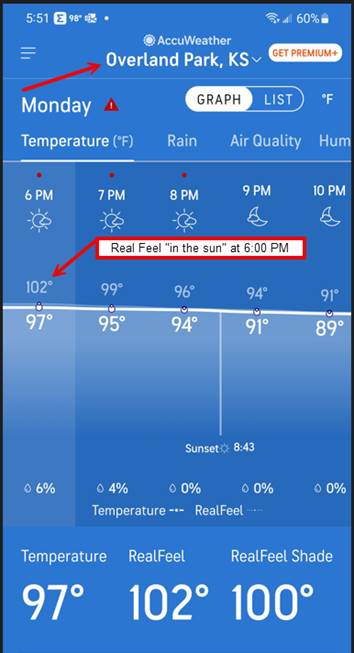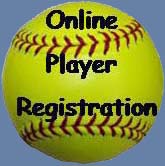Safety of its members is one of the highest priorities of the KC Metro Senior Softball League. Knowledge of symptoms can make a huge difference in recognizing and responding to serious health situations and getting treatment.
High Heat Days
When to cancel any of our games, due to heat, has been an ongoing topic of conversation within the organization and, therefore, a topic of discussion with the Board of Directors on an annual basis. In the past, we had let it up to you—our individual Conference Coordinators (in conjunction with input from the corresponding conference’s managers)—to determine when they would and would not play their respective games. Well, the board has finally made an organization-wide decision as to when KC Metro games are to be canceled and at what point they can be played due to the heat.
See those guidelines below. Please be aware that this is our initial attempt at pinpointing an agreed-upon AccuWeather “RealFeel” temperature as the go/no-go reading relative to when games will be canceled and when they can be played. Meaning??….meaning that as we trial test these current guidelines, we may find the future need to increase or lower this 100° RealFeel reading as our guide. Please be patient, and feel free to provide us with constructive feedback accordingly.
We, obviously, wish for you to share these guidelines with your fellow member. Our bottom-line goal here is our members’ safety and health. We are NOT wishing to make our play any more difficult than it already has been (dealing with the number of hot days we continue to encounter). We’d prefer every day you play to be the perfect weather day, but we know that’s not possible.
—————–
We will be using the “RealFeel” temperature readings from AccuWeather www.accuweather.com as our guide. AccuWeather also has a phone app, so all coordinators, managers, and even players will be able to access the same RealFeel information in…“real time”.
If you wish to review RealFeel’s overall 18 temperature index reading parameters, here is the link: https://www.accuweather.com/en/weather-news/accuweather-realfeel/784 . And if you wish to understand the development of the RealFeel’s guide a bit better, access this site: https://www.accuweather.com/en/accuweather-ready/accuweathers-realfeel-temperature-guide-provides-unique-outdoor-insight-amid-heat-wave/329215
We will use the “RealFeel” (not ReelFeel Shade) reading as the temperature (readily visible on the website, and on the home page of the I-Phone, or Android, phone app) as our policy’s guide. And the 100° reading, in the sun, as the no play cut-off reading.
The RealFeel temperature takes into account the temperature, humidity, wind speed and angle of the sun.
Of course, the Conference Coordinator (CC) can always make a decision to not play even if the RealFeel reading is under the 100° reading, if they so choose. If the first game starts on the 30 (i.e., 5:30) and the RealFeel reading is 100° or more at 5:00, but the RealFeel is forecasted to be under 100° at 6:00, the games may be started. The same would be for the day games. If the RealFeel reading is under 100° at the start of the game, but goes over that reading towards the end of the game (or is forecasted to go over that 100° reading by the end), they may conclude that game.
- The CC, or anyone else wishing to utilize RealFeel, can go to the AccuWeather website and type in the zip code for their appropriate ballpark to get the corresponding RealFeel information. OR…he / she can access the same AccuWeather information on their phone app. Below are snapshots of the Android phone’s AccuWeather home screen (for Overland Park, KS), and the next 4 hour forecast. Each person’s phone can be set to whatever zip code, or city / state desired, and changed as he / she wishes.


- The CC can then make the decision as to whether, or not, to cancel their games at a pre-determined time prior to their games—a time which they feel is best for their conference’s players.
- The CC can also, in the case of morning leagues, play the first game under the 100° mark and then not play the second game if over the 100° mark. In the case of the evening conferences, a CC could decide not play the first sets of game(s), but play the late games—when the RealFeel is forecasted to drop below the 100° mark.
- Non-compliance by the CC may result in removal of the CC from his / her coordinator position.
Chest Compression CPR
Here is a short demonstration of the new, easier CPR which takes the complication out of the method that was taught and practiced a few years ago. Please Watch. It’s easy to remember and you don’t have to be certified to use this method, and it may save a life! This is a great demonstration, done by the doctors who developed the procedure at the University of Arizona Sarver Heart Center. I urge you to watch and then share it with those you care about.
http://ahsc.arizona.edu/node/730
Stroke
Do you know the early warning signs for a possible, impending stroke…….as much as a month ahead of time!? Take four minutes of your time to watch this video. Those four minutes could mean a lifetime of savings for you or one of your loved ones.
https://www.youtube.com/watch?v=aiEltPD1guE
Seek immediate medical attention if you notice any signs or symptoms of a stroke, even if they seem to fluctuate or disappear. Call 911 or your local emergency number right away.
Every minute counts. Don’t wait to see if symptoms go away. The longer a stroke goes untreated, the greater the potential for brain damage and disability.
General symptoms of a stroke include:
- Sudden numbness, tingling, weakness, or loss of movement in the face, arm or leg, especially on only one side of the body.
- Sudden vision changes. Vision blurred, seeing double, or seeing blackened vision in one or both eyes.
- Sudden trouble speaking. Slurred speech.
- Sudden confusion or trouble understanding simple statements.
- Sudden problems with walking, balance, or loss of coordination.
- Sudden severe headache that is different from past headaches.
NOTICE the key word “SUDDEN” or “DIFFERENT” fron past experience.
Symptoms can vary depending on whether the stroke is caused by a blood clot (ischemic stroke) or bleeding (hemorrhagic stroke), where the stroke occurs in the brain, and how bad.
A simple test would have the person try to smile, sing a simple song, or recite a verse. Have the person raise both arms over their head and hold them there. If one arm falls, they may be having a stroke.
Concussion
Here is a list of symptoms of a concussion from the CDC. Concussions fall into four categories:
| Thinking and Remembering | Physical | Mood or Emotional | Sleep |
| Difficulty Thinking Clearly | Headache, Fuzzy or Blurred Vision | Irritability | Sleeping More Than Usual |
| Feeling Slowed Down | Nausea, Vomiting (Early On)Dizziness | Sadness | Sleeping Less Than Usual |
| Difficulty Concentrating | Sensitivity to Noise/ Light or Balance Problems | More Emotional | Trouble Falling Asleep |
| Difficulty Remembering New Information | Feeling Tired or Having No Energy | Nervousness or Anxiety |
Some of these symptoms may appear right away, while others may not be noticed for days or months after the injury, or until the person starts resuming their everyday life and more demands are placed upon them. Sometimes, people do not recognize or admit that they are having problems. Others may not understand why they are having problems and what their problems really are, which can make them nervous and upset.
The signs and symptoms of a concussion can be difficult to sort out. Early on, problems may be missed by the person with the concussion, family members, or doctors. People may look fine even though they are acting or feeling differently.
2026 Concussion Protocol_Part1 2026 Concussion Protocol_Part2 2026 Concussion Protocol_Part3
COVID-19 GUIDELINES UPDATE
UPDATED 10/1/2021
Prior KCMSSL Covid guidelines are being replaced (UNLESS mandated otherwise by any local Parks & Recreation entity’s protocol) with the following. Masks are optional. Any participating KCMSSL member contracting Covid is required to inform his/her manager and/or conference coordinator as soon as possible once the member is made aware of his/her Covid status.
Unless we are made aware of some unique situation for any reported case, neither the infected member’s team, nor any corresponding conference, will be shut down as a result. That subject member will be allowed to rejoin his/her teams/conferences once he/she provides KCMSSL with one corresponding negative PCR (polymerase chain reaction) Covid-19 test result, OR two back-to-back negative Antigen rapid-test results. Timing for the two negative rapid-tests is optional. They can be spread out (days apart), or may occur minutes apart (i.e., conducted at one pharmacy, and then conducted immediately afterwards at another pharmacy)…..as long as both are negative.

